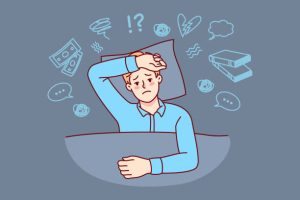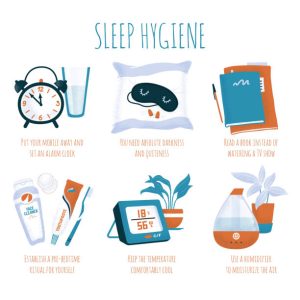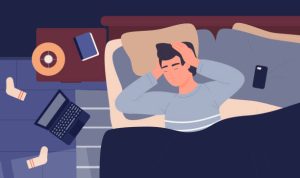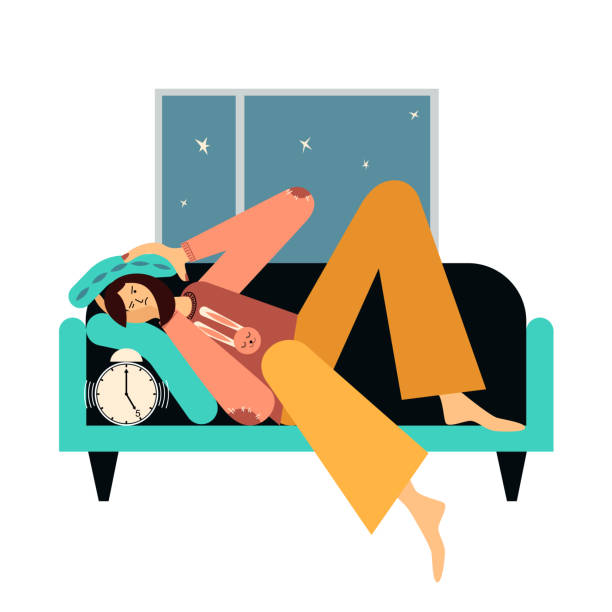Table of Contents
ToggleTossing and turning all night? Can’t seem to get that precious Zzzs? Look no further! In this article, we’ll dive into the top five reasons you’re not sleeping well. From poor sleep hygiene to stress and anxiety, medical conditions, technology use, and diet and lifestyle, we’ve got you covered. We’ll discuss how to create a comfortable sleep environment, establish a regular sleep schedule, and limit technology use before bedtime.
We’ll also explore the effects of stress and anxiety on sleep quality and provide some coping mechanisms to help you unwind. And for those of you with medical conditions that affect sleep, we’ll give you the lowdown on treatment options. So, put down that late-night coffee and read on for some handy tips and tricks to help you sleep like a baby!
Reason 1: Stress and Anxiety

Stress and anxiety can ruin even the best sleep plans with their strong connection, almost like they’re BFFs. Whether a looming deadline, a work presentation, or the everyday chaos of life, stress can frequently lead to sleeplessness. For those who tend to worry, anxiety can be just as detrimental (if not more so) to get a good night’s sleep.
The Connection Between Stress and Sleeplessness
Stress and anxiety have a powerful effect on our ability to sleep. When we’re feeling stressed or anxious, our brains are on high alert, making it difficult to relax and fall asleep. In fact, stress and anxiety are among the most common causes of sleep disturbances.
Different Types of Anxiety and How They Affect Sleep
There are several different types of anxiety, and they can all affect sleep in different ways. Generalized anxiety disorder (GAD), for example, can make it difficult to fall asleep due to excessive worrying, while social anxiety disorder (SAD) can cause sleep disturbances due to fear of embarrassing oneself in social situations.
Strategies for Managing Stress and Anxiety to Improve Sleep
Fortunately, there are several strategies you can use to manage stress and anxiety and improve your sleep. These include relaxation techniques such as deep breathing, meditation, and yoga, as well as establishing a nighttime routine that helps you wind down and get into a sleep-friendly state of mind. Prioritizing self-care by taking care of your physical and mental health can help reduce stress and anxiety and promote better sleep.
Reason 2: Poor Sleep Habits

Ah, poor sleep habits – the bane of our existence. From staying up too late binge-watching Netflix to scrolling through social media until the wee hours of the morning, we’ve all been there. But did you know that these seemingly harmless habits can have a significant impact on our health and well-being?
Staying up late and waking up at different times every day can throw our internal clock out of whack, making it harder to fall asleep at night and wake up in the morning. In addition, staring at our phones and laptops before bedtime can be detrimental. These devices emit blue light that can suppress the production of melatonin, a hormone that regulates sleep, making it harder for us to drift off to dreamland.
The Disruptive Effects of Poor Sleep Habits
For starters, staying up late and waking up at different times every day can throw our internal clock out of whack, making it harder for us to fall asleep at night and wake up in the morning. And don’t even get me started on the detrimental effects of staring at our phones and laptops before bedtime. The blue light emitted by these devices can suppress the production of melatonin, a hormone that regulates sleep, making it harder for us to drift off to dreamland.
Tips for Creating a Sleep-Friendly Environment
So, what can we do to establish healthier sleep habits? The key is to create a consistent sleep routine. This means going to bed and waking up simultaneously every day, even on weekends. It might sound boring, but your body will thank you for it. Try to wind down before bedtime by engaging in relaxing activities such as reading a book, taking a warm bath, or practicing yoga.
Another crucial factor in getting a good night’s sleep is creating a sleep-friendly environment. Keep your bedroom cool, dark, and quiet, and invest in a comfortable mattress and pillows. Consider using blackout curtains or an eye mask to block out any light, and use a white noise machine or earplugs to drown out any disruptive sounds.
Reason 3: Medical Conditions

Medical conditions can be a real pain in the neck – or in this case, a real hindrance to a good night’s sleep. We all know how important it is to get a good amount of rest each night, but unfortunately, some common medical conditions can make that easier said than done.
Common Medical Conditions That Can Impact Sleep
Medical conditions can be a real pain in the neck – or in this case, a real hindrance to a good night’s sleep. We all know how important it is to get a good amount of rest each night, but unfortunately, some common medical conditions can make that easier said than done.
Sleep Disorders That Can Disrupt Your Sleep
Sleep disorders such as insomnia, sleep apnea, and restless leg syndrome are three of the most common conditions that disrupt sleep. Insomnia is characterized by difficulty falling asleep or staying asleep, while sleep apnea causes interruptions in breathing during sleep. Restless leg syndrome causes an irresistible urge to move your legs, making it difficult to relax and fall asleep.
Treatment Options and Strategies for Managing Medical Conditions
But fear not! There are plenty of treatment options and strategies that can help manage these medical conditions and improve your sleep. For insomnia, cognitive-behavioral therapy (CBT) can be a great option, as well as medication in some cases. For sleep apnea, using a continuous positive airway pressure (CPAP) machine can make all the difference. And for restless leg syndrome, there are a variety of medications that can help ease the symptoms.
Tips for Improving Sleep with Medical Conditions
In addition to treatment options, there are a few tips and tricks you can use to improve your sleep with medical conditions. Creating a bedtime routine, avoiding caffeine and alcohol before bed, and keeping a consistent sleep schedule can all help improve your overall sleep quality. It’s also important to talk to your healthcare provider if you’re experiencing any sleep disturbances – they can help you identify any underlying medical conditions and work with you to find the best treatment plan for your individual needs. So don’t let medical conditions keep you up at night – take control of your sleep and get the rest you need to conquer each day!
Reason 4: Lifestyle Factors

Lifestyle factors can make or break a person’s overall well-being. Eating a well-balanced diet and getting regular exercise are two key factors that can greatly improve one’s quality of life. But did you know that these lifestyle choices also play a crucial role in the quality of your sleep?
The Impact of Diet and Exercise on Sleep
The food you eat and the amount of exercise you get can directly impact the quality of your sleep. Eating a diet that’s high in processed foods, sugar, and caffeine can lead to insomnia and restless sleep. On the other hand, a diet that’s high in nutrient-dense foods, like fruits, vegetables, and lean proteins, can promote more restful and restorative sleep. Regular exercise also plays a crucial role in sleep quality. Not only does it help you fall asleep faster, but it also improves the overall quality of your sleep.
The Effects of Caffeine and Alcohol on Sleep
While caffeine is a great pick-me-up in the morning, it’s important to remember that it can have lasting effects on your body. Caffeine can stay in your system for hours, so it’s best to limit your intake after midday. Alcohol, on the other hand, may make you feel sleepy initially, but it actually disrupts the quality of your sleep, leading to a more restless night.
The Role of Technology in Sleep Disruption
Technology plays a huge role in sleep disruption. The blue light emitted from our screens suppresses the production of melatonin, a hormone that regulates sleep. To combat this, try to limit your screen time before bed, or invest in a pair of blue light-blocking glasses. It’s also a good idea to create a relaxing bedtime routine that doesn’t involve technology, such as reading a book or taking a warm bath.
Reason 5: Environmental Factors

External stimuli have a profound impact on our ability to fall and stay asleep, with environmental factors playing a crucial role in determining the quality of our sleep. For instance, the buzz of traffic and the flicker of screens can affect us significantly. While some people may find the sound of the city lulling, others may require complete silence to catch some z’s.
The Impact of Noise and Light on Sleep
It’s no secret that external stimuli can have a significant impact on our sleep quality. Noise, for example, can disrupt our sleep patterns, making it harder to fall and stay asleep. Similarly, exposure to light can interfere with our body’s production of melatonin, a hormone that regulates our sleep-wake cycle. To combat these environmental factors, consider investing in noise-canceling headphones, earplugs, blackout curtains, or a sleep mask.
The Effects of Temperature and Humidity on Sleep
Temperature and humidity are two other critical environmental factors that can affect our sleep quality. The ideal sleeping temperature is around 65 degrees Fahrenheit, give or take a few degrees depending on personal preference. If it’s too hot or too cold, our bodies can struggle to regulate our core temperature, making it difficult to achieve a comfortable slumber. High humidity can also make us feel hot and sticky, leading to restless nights and groggy mornings. To create an optimal sleep environment, consider using air conditioning, fans, or a dehumidifier.
Strategies for Creating an Optimal Sleep Environment
Creating the perfect sleep environment is easier said than done. But by being mindful of the impact of environmental factors on our sleep and taking steps to mitigate their effects, we can set ourselves up for sweet dreams and well-rested days. Here are some strategies to consider:
- Invest in noise-canceling headphones, earplugs, blackout curtains, or a sleep mask to block out unwanted noise and light pollution.
- Set your bedroom temperature between 60-67 degrees Fahrenheit and around 50% humidity using air conditioning, fans, or a dehumidifier.
- Remove any distractions from your bedroom, such as electronic devices, that can interfere with your sleep quality.
- Establish a consistent bedtime routine and stick to it as much as possible to train your body to recognize when it’s time to sleep.
- Consider incorporating relaxation techniques, such as meditation or deep breathing exercises, to help calm your mind and prepare for sleep.










